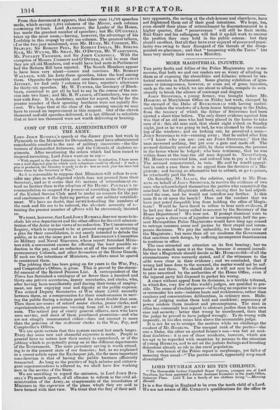MORE MAGISTERIAL INJUSTICE.
THE petty faults and follies of the Police Magistrates are so nu- merous, that both we and our readers are as weary of alluding to them as of exposing the absurdities and fallacies uttered by ora- torical senators in Parliament. Some glaring exhibition of igno- rance or intemperance, however, or some act of gross injustice, such as the one to which we are about to allude, compels us occa sionally to break the silence of contempt and disgust.
JOHN STOPFORD, a young farmer, was brought before Mr. HOSKINS at Marylebone Office on Friday last week, charged by the steward of the Duke of BUCKINGHAM with having malici- ously broken the windows of a farm-house belonging to the Duke, from the tenancy of which the father of STOPFORD had been ejected a short time before. The only direct evidence against him was that of an old man who had been placed in the house to take care of it: this old man said, that about eight o'clock on Sunday night, just as he was going to bed, he was alarmed by the smash- ing of the windows ; and on looking out, he perceived a man— JOHN STOPFORD to wit—running away ; that he called after him —" I know who you are : you are JOHN STOPFORD ;" that the man answered nothing, but got over a gate and made off. The accused distinctly proved an alibi, by three witnesses, the persons in the house where he lodged; who bore testimony, that he was within doors at the time the old man deposed to. Nevertheless, Mr. HOSKINS convicted him, and ordered him to pay a fine of 3/. The accused remonstrated, in vain. He said he would appeal: but in such a case there is no appeal from the decision of a Ma- gistrate; and having no alternative but to submit, or go to prison, he reluctantly paid the fine.
On Saturday, Mr. IsA.Acs, the solicitor, applied to Mr. Hos- KINS on behalf of JOHN STOPFORD, to receive the evidence of two men who acknowledged themselves the parties who committed the mischief; but the Magistrate refused, saying that he had adjudi- cated the ease, and he would not interfere any further. Is this man fit to sit upon the bench? Does not the conduct that we have just noted disqualify him from holding the office of Magis- trate? Would be have dared to refuse to hear such evidence, if he had any fear of being called to account by the Secretary of the Home Department? We trow not. If prompt dismissal were to follow upon a clear case of injustice or incompetency, half the pre- sent Metropolitan Police Magistrates would have long ago ceased to outrage common sense and justice by their stupid and intem- perate decisions. We pity the imbecility, we blame the error of the Magistrate; but more than all we condemn the Government that sanctions such doings, by suffering incompetent functionaries to continue in office.
The case attracted our attention on its first hearing; but we forbore to remark upon it at the time, because it seemed incredi- ble that a Magistrate should decide as Mr. HoseiNs did—if all the circumstances were correctly stated, and if the witnesses to the alibi were clear in their evidence ; and we concluded, that if wrong had been done to the accused, the matter would not be suf- fered to rest there. We should think it will not now be allowed to pass unnoticed by the authorities of the Home Office, even if the injured party feel disposed to pocket his wrong. A court without appeal from its decisions, is a terrible tribunal, in which few, very few of this world's judges, are qualified to pm- side. The sense of absolute power-lof having no superior to reverse or reconsider his -acts—induces haste and recklessness, rather than cautious and conscientious deliberation, in ordinary men. Habi- tude of judging makes them bold and confident; supremacy of power renders them insolent and presumptuous. The man in office has commonly less regard to abstract justice than to his own ease and security : better that wrong be unredressed, than that the judge be proved to have judged wrongly. To do wrong with impunity, in his idea raises him above the accountable judge.
It is not for us to arraign the motives while we challenge the conduct of Mr. Hosmars. The unequal rank of the parties—the one a Duke, the other an ejected farmer's son—was but an acci- dent doubtless : it is one of those accidents, however, which are too apt to be regarded with suspicion by persons in the situation of young HOSKINS, and to act on the jealous feelings and brooding discontent already so rife in the rural population. The conclusion of the Police report is surplusage, yet fuller of meaning than usual—" The parties retired, apparently very much dissatisfied."
















 Previous page
Previous page